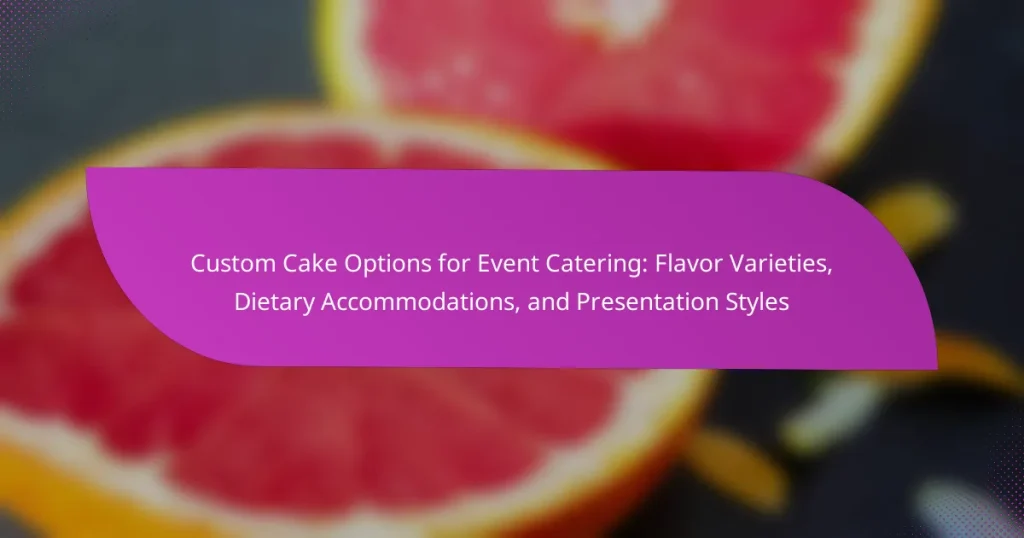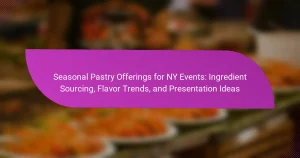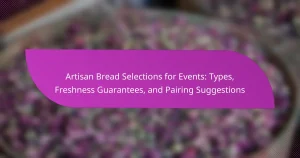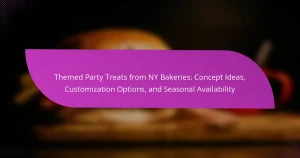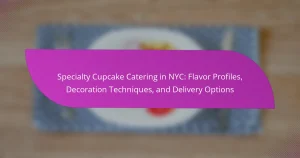Custom cakes are a versatile option for event catering, offering a wide range of flavors, designs, and dietary accommodations. Popular flavor varieties include vanilla, chocolate, red velvet, and seasonal selections like pumpkin spice. These cakes can be tailored in size, shape, and presentation style, ranging from tiered and sculpted designs to simple flat cakes and individually decorated cupcakes. Additionally, custom cakes can meet specific dietary needs, such as gluten-free, vegan, or nut-free options, ensuring there is a suitable choice for every event. Catering services often provide tastings to assist clients in selecting their preferred flavors, enhancing the overall experience.
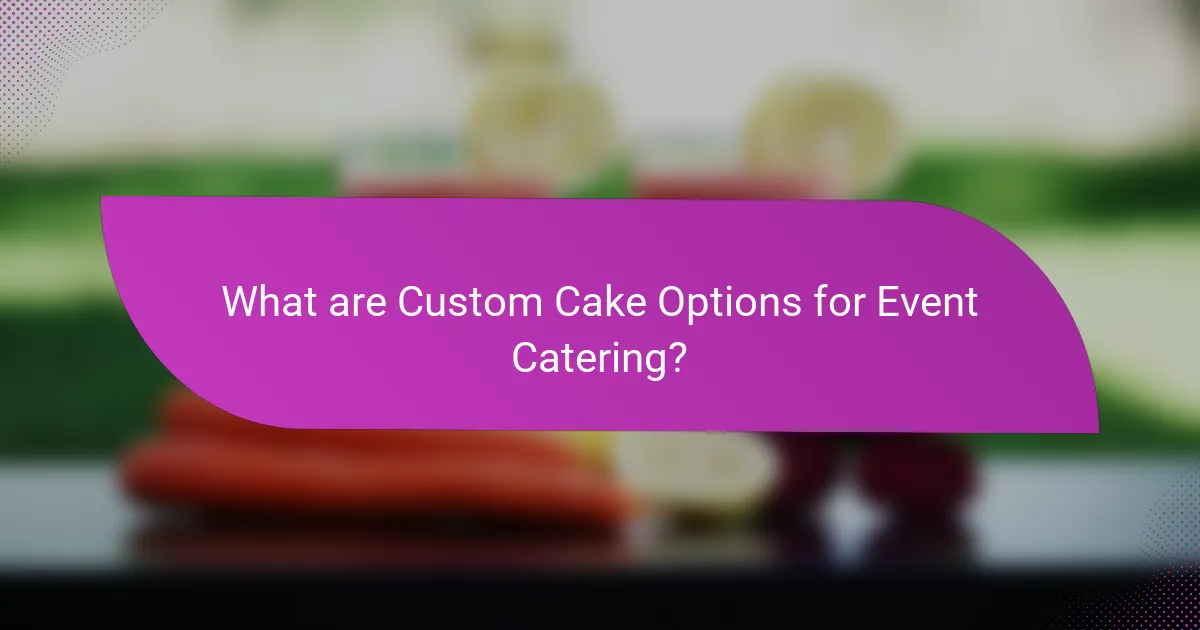
What are Custom Cake Options for Event Catering?
Custom cake options for event catering include various flavors, designs, and dietary accommodations. Common flavor varieties are vanilla, chocolate, red velvet, and lemon. Cakes can be customized in size and shape to fit the event’s theme. Dietary accommodations may include gluten-free, vegan, or nut-free options. Presentation styles can range from simple to elaborate, including fondant decorations and tiered designs. Custom cakes are often tailored to match the event’s color scheme and overall aesthetic. Many catering services offer tastings to help clients choose their preferred flavors.
How do Custom Cake Options enhance event experiences?
Custom cake options enhance event experiences by providing personalized flavors and designs. They cater to individual tastes and dietary needs. Customization fosters a sense of uniqueness for each event. Guests feel more engaged when cakes reflect the theme or purpose of the gathering. Studies show that visually appealing desserts increase overall satisfaction at events. Custom cakes can also accommodate allergies or dietary restrictions, ensuring all guests can enjoy them. This inclusivity promotes a positive atmosphere. Additionally, a well-designed cake serves as a focal point, enhancing the overall aesthetics of the event.
What role do flavors play in custom cakes for events?
Flavors are essential in custom cakes for events as they directly influence guest enjoyment. A well-chosen flavor can enhance the overall experience of the event. Popular flavors like chocolate, vanilla, and red velvet cater to diverse preferences. Unique flavors can also create memorable experiences and spark conversations among guests. Additionally, flavors can be tailored to match the theme or season of the event. For instance, citrus flavors may be preferred for summer events. The right flavor can elevate the cake from a mere dessert to a centerpiece. Ultimately, flavors play a crucial role in ensuring satisfaction and creating lasting memories associated with the event.
How can presentation styles impact guest impressions?
Presentation styles significantly influence guest impressions by shaping their initial perceptions and overall enjoyment. A visually appealing cake can create excitement and anticipation among guests. Research indicates that 93% of first impressions are based on visual appearance, suggesting that presentation is crucial. Elegant designs and thoughtful arrangements enhance the perceived quality of the cake. Guests often associate intricate presentation with higher craftsmanship and taste. Additionally, unique presentation styles can spark conversation and engagement among attendees. Overall, effective presentation can elevate the event experience and leave a lasting impression on guests.
Why are Dietary Accommodations important in Custom Cakes?
Dietary accommodations are important in custom cakes to ensure inclusivity for all guests. Many individuals have specific dietary needs due to allergies, intolerances, or lifestyle choices. For instance, gluten-free options are necessary for those with celiac disease. Vegan cakes cater to those avoiding animal products. Additionally, accommodating dietary restrictions can enhance customer satisfaction and broaden the cake’s appeal. According to a study by the Food Allergy Research and Education (FARE), approximately 32 million Americans have food allergies. This statistic underscores the necessity of dietary accommodations in custom cakes to promote safety and enjoyment for everyone at events.
What dietary restrictions should be considered when designing custom cakes?
When designing custom cakes, several dietary restrictions should be considered. Common restrictions include gluten intolerance and celiac disease, which require gluten-free ingredients. Dairy allergies necessitate the use of dairy-free alternatives. Vegan diets exclude all animal products, demanding plant-based ingredients. Nut allergies are critical, as cross-contamination can be dangerous. Sugar-free options are important for those with diabetes. Additionally, low-carb diets may require reduced carbohydrate content. Each restriction influences ingredient selection and recipe formulation. Awareness of these dietary needs ensures safe and enjoyable options for all guests.
How can custom cakes cater to different dietary preferences?
Custom cakes can cater to different dietary preferences by offering various ingredient substitutions. For gluten-free diets, cakes can be made using almond flour or gluten-free flour blends. Vegan cakes can replace eggs and dairy with ingredients like applesauce or coconut milk. For low-sugar options, natural sweeteners such as stevia or erythritol can be used. Additionally, cakes can be tailored for nut-free diets by avoiding nuts and using safe alternatives. Customization allows for the inclusion of organic or non-GMO ingredients for health-conscious consumers. These adaptations ensure that everyone can enjoy a delicious cake tailored to their dietary needs.
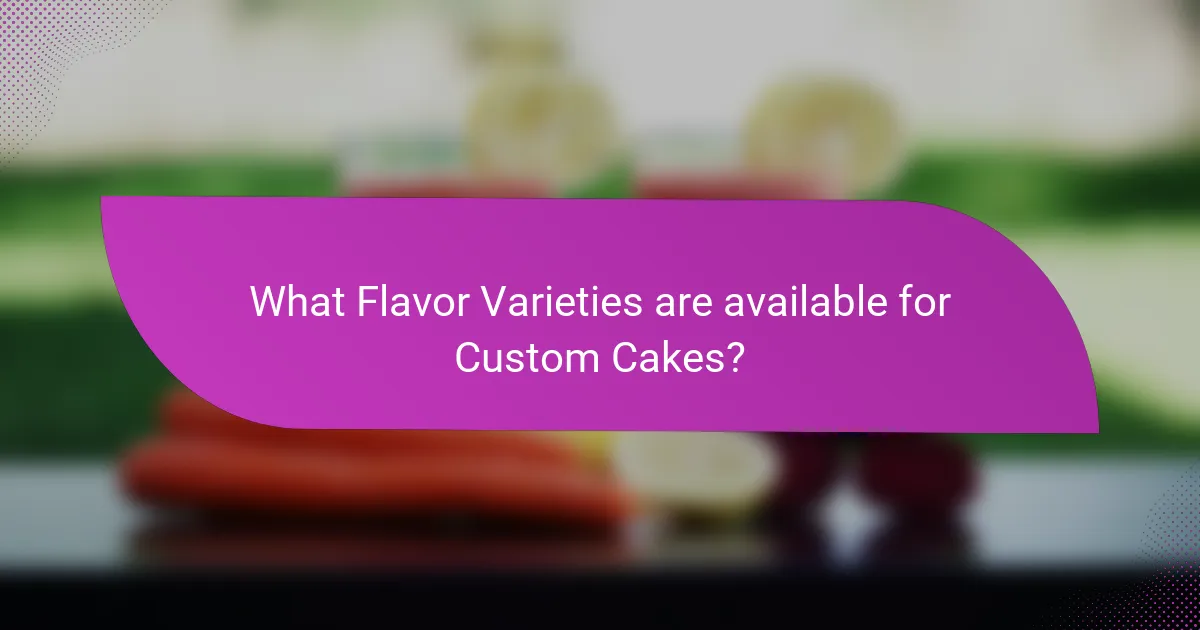
What Flavor Varieties are available for Custom Cakes?
Custom cakes are available in a wide range of flavor varieties. Common flavors include vanilla, chocolate, and red velvet. Other popular options are lemon, carrot, and almond. Some bakeries offer unique flavors like coconut, marble, and funfetti. Seasonal flavors such as pumpkin spice and peppermint are also available. Customization allows for combinations, such as chocolate raspberry or lemon blueberry. Many bakeries can accommodate specific requests for flavors. This variety ensures that there is a flavor for every preference and occasion.
How do traditional and modern flavors differ in event catering?
Traditional flavors in event catering typically include classic options like vanilla, chocolate, and red velvet. These flavors have historical significance and are widely accepted by diverse audiences. Modern flavors, on the other hand, often incorporate unique ingredients like matcha, lavender, and salted caramel. They appeal to contemporary palates seeking innovative experiences. Traditional flavors focus on familiarity and comfort, while modern flavors emphasize creativity and experimentation. The shift towards modern flavors reflects changing consumer preferences for diverse and adventurous tastes. According to a survey by the Specialty Food Association, 60% of consumers are interested in trying new flavors. This trend influences catering choices, leading to a blend of both traditional and modern options.
What are some popular traditional cake flavors for events?
Popular traditional cake flavors for events include vanilla, chocolate, and red velvet. Vanilla cake is widely loved for its classic taste and versatility. Chocolate cake is a favorite for its rich flavor and moisture. Red velvet cake stands out for its unique color and subtle cocoa taste. Lemon cake offers a refreshing citrus twist. Carrot cake is popular for its spiced flavor and texture from grated carrots. These flavors are often chosen for weddings, birthdays, and other celebrations due to their broad appeal.
What modern flavor trends are emerging in custom cakes?
Modern flavor trends in custom cakes include unique combinations and bold flavors. Popular choices now feature floral flavors like lavender and elderflower. Exotic spices such as cardamom and chai are also gaining traction. Additionally, savory elements like herbs and cheese are being incorporated into sweet cakes.
Fruit flavors are evolving with trends like citrus blends and tropical fruits. Specialty diets are influencing flavors, such as gluten-free and vegan options. Custom cakes now often include unexpected ingredients like matcha and activated charcoal. These trends reflect a desire for innovative and personalized cake experiences.
What unique flavor options can be offered for custom cakes?
Unique flavor options for custom cakes include lavender, matcha, and chai. Lavender offers a floral note that pairs well with lemon. Matcha provides an earthy, slightly bitter taste, appealing to green tea lovers. Chai incorporates warm spices like cinnamon and cardamom for a comforting flavor. Other options include pistachio, which adds a nutty richness. Red velvet combines cocoa and buttermilk for a unique texture and taste. Lemon blueberry combines tartness with sweetness for a refreshing profile. These flavors cater to diverse palates and enhance the cake experience.
How do seasonal ingredients influence flavor choices?
Seasonal ingredients significantly influence flavor choices in custom cakes. They provide fresh and vibrant flavors that reflect the time of year. For example, summer brings fruits like berries and peaches, which enhance sweetness and tartness. Winter offers spices like cinnamon and nutmeg, adding warmth and depth. Seasonal ingredients also align with consumer preferences for freshness and sustainability. Research indicates that 70% of consumers prefer seasonal products for their taste and quality. Using seasonal ingredients can create unique flavor profiles that resonate with event themes and celebrations. This approach not only elevates the cake’s taste but also appeals to guests seeking authentic culinary experiences.
What are some creative flavor combinations for custom cakes?
Creative flavor combinations for custom cakes include lemon and lavender, chocolate and raspberry, and vanilla and chai. Lemon and lavender create a refreshing floral taste. Chocolate and raspberry provide a rich and tangy contrast. Vanilla and chai offer warm spices with a sweet base. Other combinations are almond and coconut, which create a tropical flavor profile. Red velvet and cream cheese frosting is a classic pairing. Matcha and white chocolate offer a unique earthy sweetness. Each combination enhances the cake’s overall appeal and can be tailored to suit various occasions.
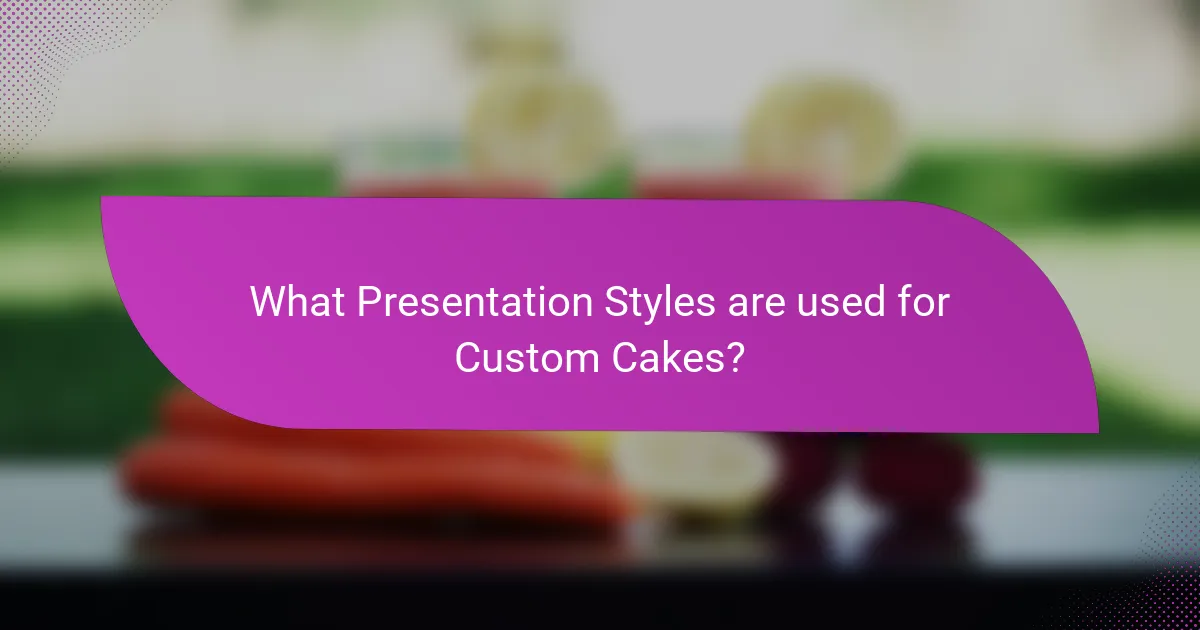
What Presentation Styles are used for Custom Cakes?
Custom cakes are presented in various styles to enhance their visual appeal. Common presentation styles include tiered cakes, which stack multiple layers for height and elegance. Another style is the sculpted cake, designed to resemble objects or characters, showcasing creativity. Flat cakes, often used for sheet cakes, provide a simple, classic look. Additionally, cupcakes can be decorated individually for a playful presentation. The use of decorative stands and platters further elevates the display. Each style serves to complement the theme of the event, creating a memorable experience.
How does the presentation of a custom cake affect its appeal?
The presentation of a custom cake significantly enhances its appeal. Visually appealing cakes attract attention and create excitement among guests. A well-decorated cake can serve as a centerpiece at events, drawing admiration. The use of colors, textures, and designs plays a crucial role in this visual impact. For instance, cakes adorned with intricate designs or vibrant colors can evoke positive emotions. Studies show that people are more likely to enjoy food that looks attractive. This phenomenon is known as the “visual appeal effect.” A custom cake’s presentation can also reflect the theme of the event, enhancing overall guest experience. Therefore, effective presentation is essential for maximizing a custom cake’s appeal.
What are some common presentation styles for event cakes?
Common presentation styles for event cakes include tiered, single-layer, and sculpted designs. Tiered cakes feature multiple stacked layers, often decorated with intricate designs. They are popular for weddings and large celebrations. Single-layer cakes are simpler and can be elegantly decorated with frosting or fondant. Sculpted cakes are designed to resemble objects or themes, adding a unique touch to events. Each style caters to different themes and preferences, enhancing the visual appeal of the cake.
How can cake decoration techniques enhance visual impact?
Cake decoration techniques enhance visual impact by creating appealing aesthetics. Techniques such as fondant smoothing, piped borders, and intricate sugar flowers add depth and texture. Color contrasts from edible paints or natural dyes draw attention. Layering styles, like ombre or marbling, create striking visual effects. The use of personalized toppers or themed decorations adds uniqueness. Research indicates that visually appealing cakes increase perceived taste and desirability. A study by the University of Oxford found that presentation affects taste perception significantly.
What are some innovative presentation ideas for custom cakes?
Creative presentation ideas for custom cakes include using unique cake stands. Elevated stands add height and visual interest. Another idea is incorporating themed decorations that match the event. Edible flowers can enhance the aesthetic appeal. Additionally, multi-tiered designs create a striking centerpiece. Using transparent cake domes provides an elegant display while keeping the cake fresh. Finally, interactive elements, like a cake cutting station, engage guests and enhance the experience. These methods elevate the overall presentation and make the cake a focal point at any event.
How can themed decorations complement the overall event atmosphere?
Themed decorations enhance the overall event atmosphere by creating a cohesive visual experience. They align the event’s aesthetic with its purpose or theme. For instance, a tropical theme can use vibrant colors and floral arrangements to evoke a beach vibe. This visual consistency helps guests feel immersed in the event. Studies show that well-executed decorations can increase guest satisfaction by up to 30%. Themed decorations also serve as conversation starters, encouraging interaction among attendees. Overall, they play a crucial role in setting the mood and enhancing the thematic experience.
What role does cake size and shape play in presentation?
Cake size and shape significantly influence its presentation. The size of a cake determines the visual impact it has on the table. Larger cakes often serve as a centerpiece, drawing attention and creating a focal point. Conversely, smaller cakes can appear more delicate and intimate, suitable for smaller gatherings.
The shape of a cake also plays a crucial role in its aesthetic appeal. Traditional round cakes symbolize celebration and are often used for birthdays and weddings. Square or rectangular cakes can convey a modern look and are often used for corporate events.
Different shapes can also enhance the theme of an event. For instance, themed cakes shaped like objects or characters can create a memorable experience for guests. Additionally, unique shapes may allow for more creative decoration options, enhancing the overall presentation.
In summary, both cake size and shape are essential elements in creating an appealing visual presentation that aligns with the event’s theme and atmosphere.
What are the best practices for choosing Custom Cake Options for events?
Identify the event type and theme before choosing custom cake options. This ensures the cake aligns with the overall atmosphere. Consider the guest preferences and dietary restrictions. Popular options include gluten-free, vegan, and nut-free cakes. Choose a flavor that appeals to a wide audience, such as chocolate or vanilla. Determine the cake size based on the number of guests. A standard serving is typically one slice per person. Discuss design elements with the baker to ensure the cake matches the event’s aesthetic. Research local bakers for quality and reviews. Look for portfolios showcasing previous work to assess style and creativity.
Custom cake options for event catering encompass a wide range of flavors, dietary accommodations, and presentation styles. The article details popular flavor varieties, including traditional options like vanilla and chocolate, as well as modern trends featuring unique combinations and seasonal ingredients. It emphasizes the importance of dietary considerations, such as gluten-free and vegan options, to ensure inclusivity for all guests. Additionally, the article explores various presentation styles that enhance the visual appeal of custom cakes, highlighting how size, shape, and decoration techniques contribute to the overall event experience.
